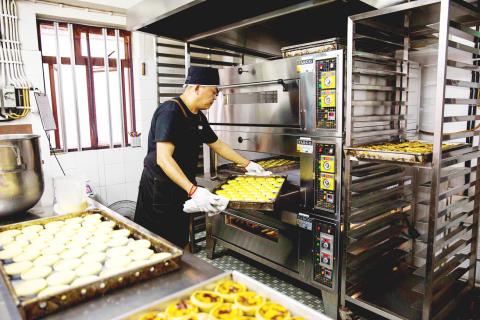With their flaky pastry casing, creamy custard filling and brulee topping, Macau’s Portuguese egg tarts are as much a part of the Chinese enclave’s fabric as its casinos — but their origin is surprisingly British.
Across the city it is not uncommon to see long lines of tourists patiently queuing for the sweet treats, a sight that might not seem all that surprising given the former Portuguese colony’s most famous dessert is based on Lisbon’s equally renowned pastel de nata.
But the current craze for Portuguese-style egg tarts — which has spread across China and parts of Asia in recent years — owes much of its success to a Briton who blundered into the business.

Photo: AFP
The tale began three decades ago when Essex-born industrial pharmacist Andrew Stow opened Lord Stow’s bakery at the southern harborside village of Coloane.
“In 1989, recognizing there were no Western street-side bakeries... he decided to do something for the local Portuguese community, which was to create a pastel de nata for them,” said Eileen Stow, Andrew’s sister, who now manages the business.
With no original recipe for pastel de nata to use, Andrew experimented with a heavier British custard filling, based on a family recipe, and Portuguese pastry techniques.
The creation initially raised a few eyebrows among Andrew’s Portuguese friends in Macau, but the local Chinese community became hooked.
Courtesy of the British, Cantonese cuisine already had a version of an egg tart, made with shortcrust pastry and a more jelly-like filling.
“To differentiate it from what they recognized in dim sum, a dan tat [egg tart in Cantonese,] they call it a po tat,” meaning Portuguese egg tart, Eileen said.
The creamier, flakier, richer versions were a roaring success.
“That’s how it grew before the days of ‘likes’ online. It’s just word of mouth,” added Eileen, who took over the business after her brother’s death in 2006.
The business now churns out 21,000 handmade egg tarts per day from three bakeries in Macau, and it also boasts two franchises in Japan and Manila.
A string of rivals have cropped up in the last three decades in Hong Kong, Taiwan and Singapore.
One of the best-regarded Macau competitors was set up by Andrew’s ex-wife Margaret Wong.
She sold her recipe to KFC, which now offers Portuguese egg tarts at outlets across China, a move that has introduced Macau’s Portuguese-British hybrid to hundreds of millions more hungry mouths.

Towering high above Taiwan’s capital city at 508 meters, Taipei 101 dominates the skyline. The earthquake-proof skyscraper of steel and glass has captured the imagination of professional rock climber Alex Honnold for more than a decade. Tomorrow morning, he will climb it in his signature free solo style — without ropes or protective equipment. And Netflix will broadcast it — live. The event’s announcement has drawn both excitement and trepidation, as well as some concerns over the ethical implications of attempting such a high-risk endeavor on live broadcast. Many have questioned Honnold’s desire to continues his free-solo climbs now that he’s a

As Taiwan’s second most populous city, Taichung looms large in the electoral map. Taiwanese political commentators describe it — along with neighboring Changhua County — as Taiwan’s “swing states” (搖擺州), which is a curious direct borrowing from American election terminology. In the early post-Martial Law era, Taichung was referred to as a “desert of democracy” because while the Democratic Progressive Party (DPP) was winning elections in the north and south, Taichung remained staunchly loyal to the Chinese Nationalist Party (KMT). That changed over time, but in both Changhua and Taichung, the DPP still suffers from a “one-term curse,” with the

Jan. 26 to Feb. 1 Nearly 90 years after it was last recorded, the Basay language was taught in a classroom for the first time in September last year. Over the following three months, students learned its sounds along with the customs and folktales of the Ketagalan people, who once spoke it across northern Taiwan. Although each Ketagalan settlement had its own language, Basay functioned as a common trade language. By the late 19th century, it had largely fallen out of daily use as speakers shifted to Hoklo (commonly known as Taiwanese), surviving only in fragments remembered by the elderly. In

William Liu (劉家君) moved to Kaohsiung from Nantou to live with his boyfriend Reg Hong (洪嘉佑). “In Nantou, people do not support gay rights at all and never even talk about it. Living here made me optimistic and made me realize how much I can express myself,” Liu tells the Taipei Times. Hong and his friend Cony Hsieh (謝昀希) are both active in several LGBT groups and organizations in Kaohsiung. They were among the people behind the city’s 16th Pride event in November last year, which gathered over 35,000 people. Along with others, they clearly see Kaohsiung as the nexus of LGBT rights.